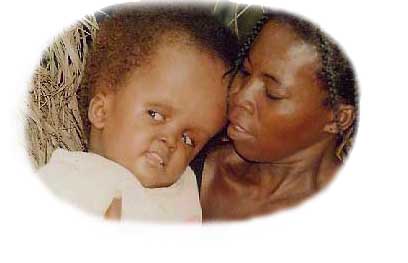
An African refugee's story By Mark Doyle for the BBC
(Report copied by kind permission of the BBC)

An African refugee's story By Mark Doyle for the BBC
(Report copied by kind permission of the BBC)
Many civilians have fled fighting in Sierra Leone. When I first set eyes on four-year-old Fatoumata Seesay, a small girl carried in her mother's arms, I looked away, unable to cope. I was in a camp for Sierra Leonian refugees in Liberia, and the sun had reached its midday zenith.
As usual when a journalist visits refugees
in Africa, I was surrounded by a heaving throng of people desperate to tell
stories of injustice and inhumanity. The body heat from the crowd, and the smell
of stale sweat, was mingling with the heat haze from the sandy ground. Then
Fatoumata Seesay's mother pushed through the crowd and pulled a dirty cloth
off her
daughter's body to reveal her horribly swollen head "This is my daughter,"
the refugee mother said. "I need help".
Human instinct - I looked away because I had never seen such a dreadful deformity before. Fatoumata's head - her face, her skull - was swollen at least three times larger than it should be. Her hair, which should have been dark African curls, was wispy and weak. The girl laid her heavy head on her mother's shoulders and her mother, Maimuna, could hardly cope with the weight. I suppose I looked away because this vision was just too shocking to take in, even for someone who has seen a fair bit of suffering caused by African wars. Not only was this child in a refugee camp, born of a penniless mother, but she was also desperately sick, my instinct was to walk away. Nothing can be done, sad, but hopeless.
However, I was working with some African journalists who were made of sterner stuff. They said, quite correctly, "let's get her story, if her mother wants to tell it". Maimuna wept as she told her story, obviously beside herself with grief and guilt and motherly love.
Fatoumata was born normal, if it can be said
to be normal to be born a refugee. But then her head began swelling. She was
diagnosed as having hydrocephalus, a disease where excess fluid on the brain
cannot be released and causes swelling. A doctor in the refugee camp, an obviously
respected young Liberian woman, said she treated Fatoumata as best she could.
But this doctor was working in a dirty wooden shack with no floorboards, her
only apparent resources being a stethoscope around her neck and a comforting
smile.
We asked the doctor if Fatoumata could be treated. "Maybe," she said, "But not in this place". She said even with proper treatment the girl had only a 50/50 chance of survival. Then we spoke to an official of the United Nations Refugee agency that runs the camp. It turned out that Fatoumata had also seen a medical specialist but that, ultimately, the financial resources were not available to treat her. There was a slim chance, the UN official said, that the girl might get further help, but, he added, one should not hold out too much hope.
You might ask why I am telling this story. After all this is just one girl. Just one displaced person among millions scattered by the three-way war being fought between Liberia, Sierra Leone and Guinea. It is a war fought through proxy rebel groups. It's a conflict for control of diamond mines and other financial resources. This is, indeed, just one case, and a fairly hopeless one at that. But the African journalists I was working with thought it was quite obvious why we should tell Fatoumata's story.
"Someone, somewhere," they said,
with a clarity which cut through the fog of emotions, might pay for her and
her mother to go to a hospital, where they belong." Fatoumata's plight
probably won't change, and if it does, it won't change the world. It certainly
won't change the situation of hundreds of thousands of other war refugees in
west Africa whose desperate, daily grind passes virtually unnoticed. Fatoumata's
mother, Maimuna, was just one of the heaving throng that crowded around us in
the refugee camp, rich visitors from another world. As we left, some of them,
as usual, and understandably, asked for money.
Maimuna did not ask for a penny. "I just want you to tell my daughter's story," she said.
AvRICA assisted with an intense coordinated International effort to get Fatoumata to hospital in South Africa, sadly before we could brave little Fatoumata lost her struggle for life.